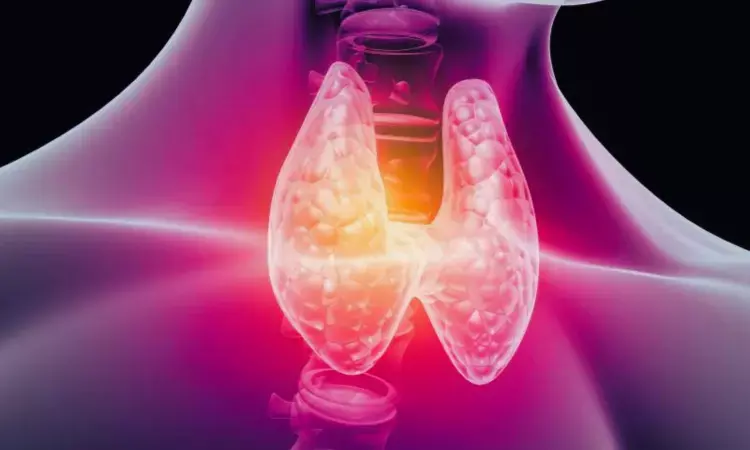- Home
- Medical news & Guidelines
- Anesthesiology
- Cardiology and CTVS
- Critical Care
- Dentistry
- Dermatology
- Diabetes and Endocrinology
- ENT
- Gastroenterology
- Medicine
- Nephrology
- Neurology
- Obstretics-Gynaecology
- Oncology
- Ophthalmology
- Orthopaedics
- Pediatrics-Neonatology
- Psychiatry
- Pulmonology
- Radiology
- Surgery
- Urology
- Laboratory Medicine
- Diet
- Nursing
- Paramedical
- Physiotherapy
- Health news
- Fact Check
- Bone Health Fact Check
- Brain Health Fact Check
- Cancer Related Fact Check
- Child Care Fact Check
- Dental and oral health fact check
- Diabetes and metabolic health fact check
- Diet and Nutrition Fact Check
- Eye and ENT Care Fact Check
- Fitness fact check
- Gut health fact check
- Heart health fact check
- Kidney health fact check
- Medical education fact check
- Men's health fact check
- Respiratory fact check
- Skin and hair care fact check
- Vaccine and Immunization fact check
- Women's health fact check
- AYUSH
- State News
- Andaman and Nicobar Islands
- Andhra Pradesh
- Arunachal Pradesh
- Assam
- Bihar
- Chandigarh
- Chattisgarh
- Dadra and Nagar Haveli
- Daman and Diu
- Delhi
- Goa
- Gujarat
- Haryana
- Himachal Pradesh
- Jammu & Kashmir
- Jharkhand
- Karnataka
- Kerala
- Ladakh
- Lakshadweep
- Madhya Pradesh
- Maharashtra
- Manipur
- Meghalaya
- Mizoram
- Nagaland
- Odisha
- Puducherry
- Punjab
- Rajasthan
- Sikkim
- Tamil Nadu
- Telangana
- Tripura
- Uttar Pradesh
- Uttrakhand
- West Bengal
- Medical Education
- Industry
Impaired Thyroid Hormone Sensitivity Tied to Higher Mortality in CKD Patients with Normal Thyroid Function, Study Finds

China: A new study has highlighted a concerning link between impaired sensitivity to thyroid hormone and increased all-cause mortality in euthyroid individuals suffering from chronic kidney disease (CKD).
The study, published in BMC Public Health, revealed that impaired thyroid hormone sensitivity may be associated with higher mortality rates in CKD patients with normal thyroid function, independent of other traditional risk factors and comorbidities. However, the researchers acknowledge that the nature of this association is currently unclear and requires further investigation to confirm and explore.
The researchers noted a strong association between the Thyroid Feedback Quantile-based Index (TFQI) and all-cause mortality among patients with stage 1–4 chronic kidney disease in a representative sample of US adults on the NHANES 2007–2010 data.
"In this cohort study, we identified a linear relationship between TFQI levels and all-cause mortality in CKD patients. After adjusting for confounding factors, higher TFQI levels were independent risk factors for increased all-cause mortality (HR = 1.40)," the researchers wrote.
Chronic kidney disease affects millions globally and is characterized by the gradual loss of kidney function. Thyroid dysfunction is commonly observed in CKD patients, but not all individuals exhibit overt thyroid disease. Many patients with CKD remain euthyroid, meaning their thyroid hormone levels fall within the normal range. However, recent findings indicate that these individuals may still be at risk due to their impaired sensitivity to thyroid hormones.
Zhiyong Zhao, Department of Endocrinology, Affiliated Wujin Hospital of Jiangsu University, Changzhou, Jiangsu, China, and colleagues aimed to investigate the association between central sensitivity to thyroid hormones and all-cause mortality in euthyroid patients with CKD.
For this purpose, the researchers extracted data on thyroid function indicators and all-cause mortality for CKD patients from the NHANES database (2007–2012). Central sensitivity to thyroid hormones was primarily assessed using the Thyroid Feedback Quantile-based Index (TFQI). To investigate potential links between thyroid hormone sensitivity and all-cause mortality, the study employed the Kaplan–Meier method, Cox proportional hazards regression model, and subgroup analysis.
The researchers reported the following findings:
- The study enrolled a total of 1303 euthyroid CKD patients. After a median follow-up of 115 months, 503 participants died.
- The Kaplan-Meier analysis demonstrated significant variations in survival rates among different levels of TFQI.
- Cox regression analysis showed that increased levels of TFQI were independent risk factors for all-cause mortality after adjusting for multiple confounding factors (HR = 1.40).
- Subgroup analysis did not reveal significant variation in the association between TFQI and all-cause mortality between the subgroups assessed.
"Our study suggests that impaired sensitivity to thyroid hormone might be linked to increased mortality in euthyroid CKD patients. Additional research is required to validate and further investigate this association," the researchers concluded.
Reference:
Yang, Q., Dong, R., Yan, H. et al. Impaired sensitivity to thyroid hormone correlates to all-cause mortality in euthyroid individuals with chronic kidney disease. BMC Public Health 24, 2134 (2024). https://doi.org/10.1186/s12889-024-19660-x
Dr Kamal Kant Kohli-MBBS, DTCD- a chest specialist with more than 30 years of practice and a flair for writing clinical articles, Dr Kamal Kant Kohli joined Medical Dialogues as a Chief Editor of Medical News. Besides writing articles, as an editor, he proofreads and verifies all the medical content published on Medical Dialogues including those coming from journals, studies,medical conferences,guidelines etc. Email: drkohli@medicaldialogues.in. Contact no. 011-43720751


